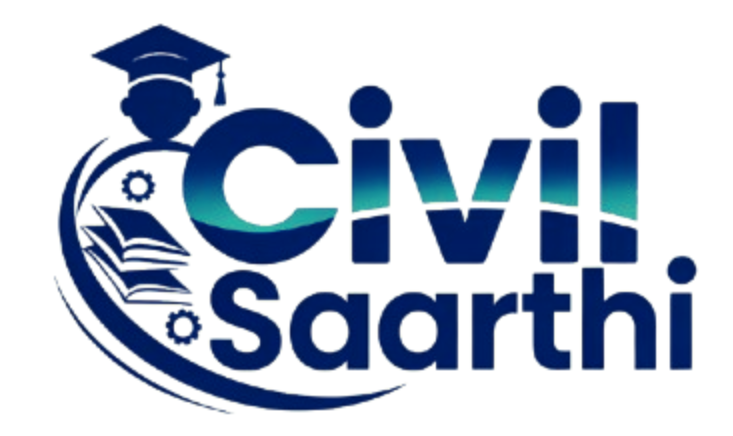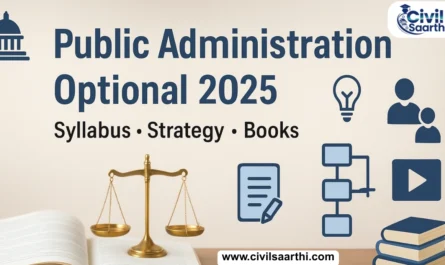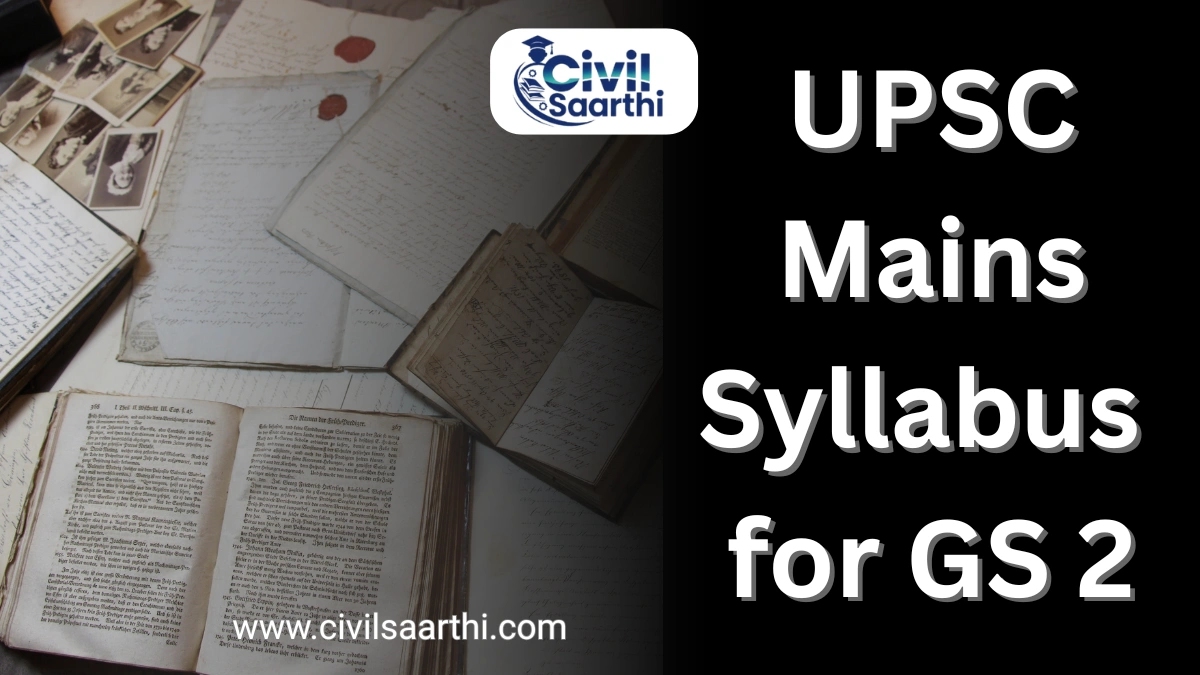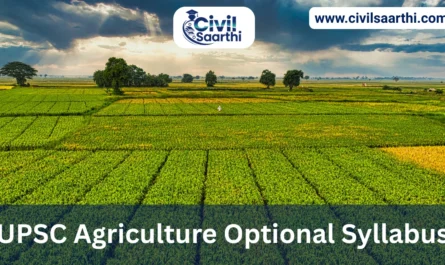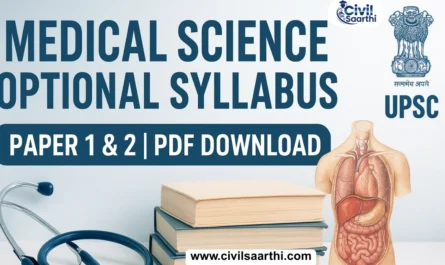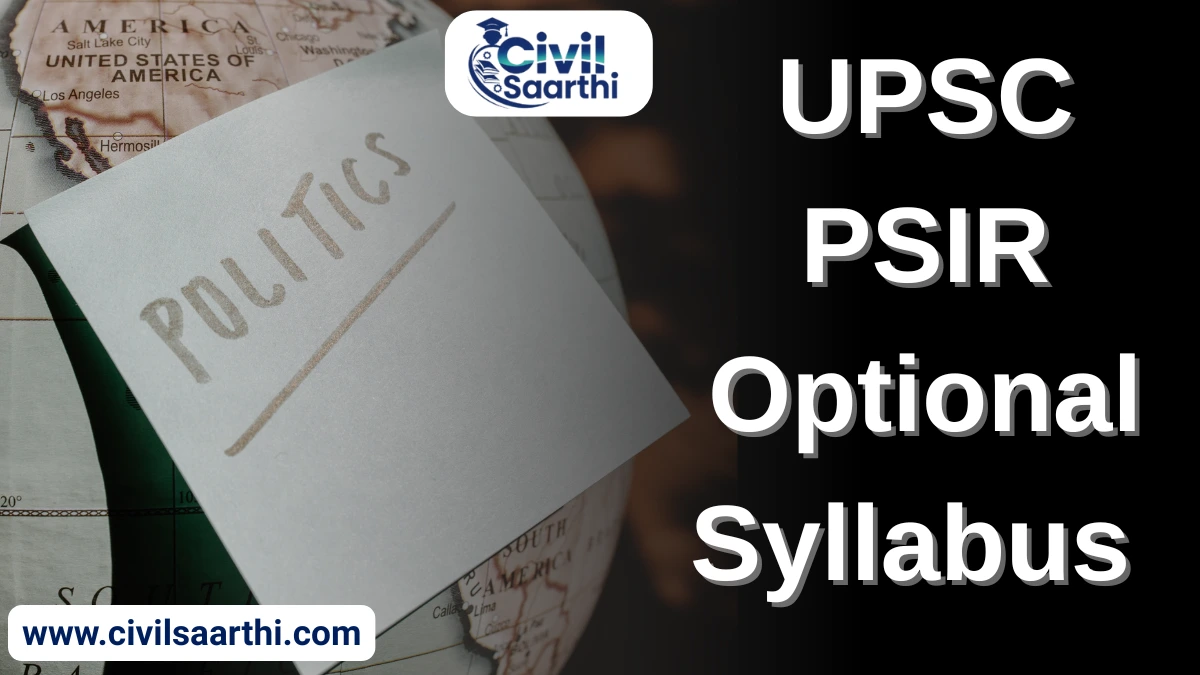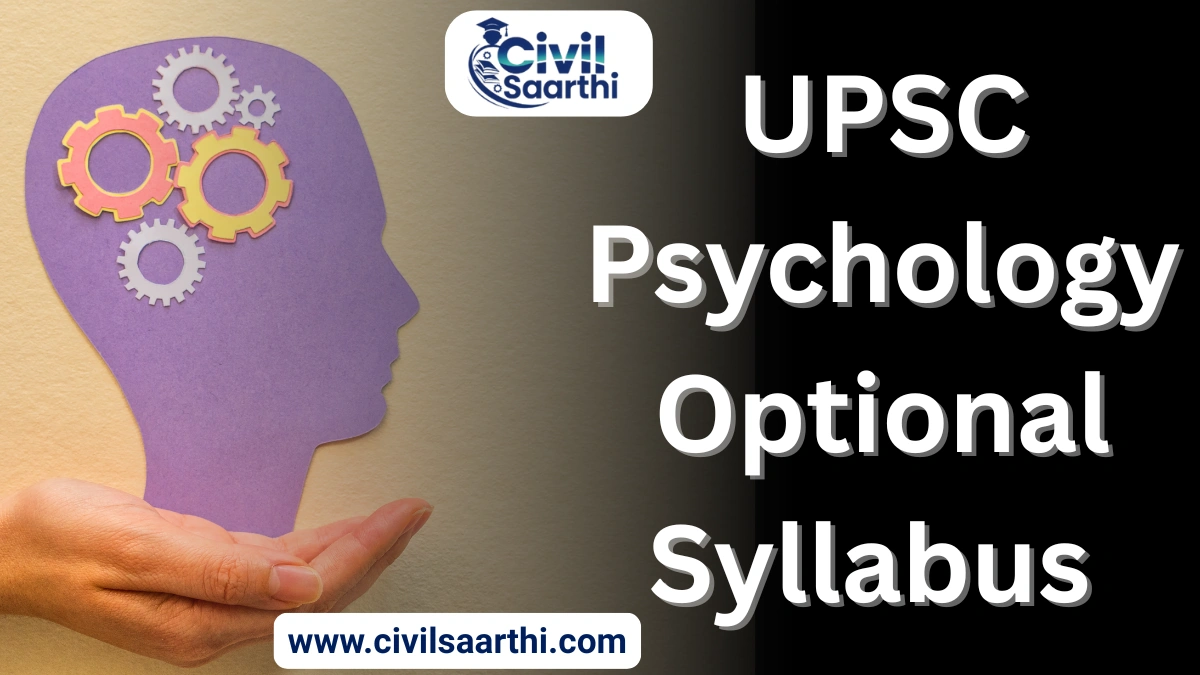The UPSC Mains Syllabus 2025 for GS 1 is the first General Studies paper in the written stage of the Civil Services Examination (CSE). This paper holds immense weight in the selection process and assesses an aspirant’s understanding of India’s heritage, history, society, and geography. The questions are analytical in nature, and the answers are expected to be written in essay format. Hence, clarity of concepts and in-depth understanding is crucial.
This guide gives a detailed breakdown of every section included in the UPSC Mains Syllabus 2025 for GS 1, along with tables and topic-wise elaboration. Each component is essential, not just for the GS paper but also for the Essay and Interview stages.
UPSC Mains Syllabus 2025 for GS 1
General Studies-I: Indian Heritage and Culture, History and Geography of the World and Society.
- Indian culture will cover the salient aspects of Art Forms, literature and Architecture from ancient to modern times.
- Modern Indian history from about the middle of the eighteenth century until the present- significant events, personalities, issues.
- The Freedom Struggle — its various stages and important contributors/contributions from different parts of the country.
- Post-independence consolidation and reorganization within the country.
- History of the world will include events from the 18th century such as industrial revolution, world wars, redrawal of national boundaries, colonization, decolonization, political philosophies like communism, capitalism, socialism etc.— their forms and effect on the society.
- Salient features of Indian Society, Diversity of India.
- Role of women and women’s organization, population and associated issues, poverty and developmental issues, urbanization, their problems and their remedies.
- Effects of globalization on Indian society.
- Social empowerment, communalism, regionalism & secularism.
- Salient features of world’s physical geography.
- Distribution of key natural resources across the world (including South Asia and the Indian subcontinent); factors responsible for the location of primary, secondary, and tertiary sector industries in various parts of the world (including India).
- Important Geophysical phenomena such as earthquakes, Tsunami, Volcanic activity, cyclone etc., geographical features and their location-changes in critical geographical features (including water-bodies and ice-caps) and in flora and fauna and the effects of such changes.
UPSC Mains Syllabus 2025 for GS 1 Overview
The UPSC Mains Syllabus 2025 for GS 1 serves as a foundational pillar in the Civil Services Mains Examination. It comprehensively tests a candidate’s understanding of India’s historical evolution, cultural richness, societal dynamics, and geographical features. The syllabus is multidisciplinary and often interlinked with current affairs, making conceptual clarity and analytical depth essential.
| UPSC Mains Syllabus 2025 for GS 1 Overview | |
| Section | Topics Covered |
| Indian Heritage and Culture |
|
| History |
|
| World History |
|
| Indian Society |
|
| Geography |
|
| Official Website | upsc.gov.in |
Indian Art and Culture – UPSC Mains Syllabus 2025 for GS 1
The UPSC Mains Syllabus 2025 for GS 1 gives prominence to India’s deep and diverse cultural past. This section evaluates how well an aspirant understands India’s traditional values, legacy, and aesthetic development. Topics such as ancient sculptures, temple architecture, music, dance, language evolution, and philosophical schools are often asked.
Indian Art and Culture – UPSC Mains Syllabus 2025 for GS 1 | |
| Topic Category | Sub-topics |
| Art Forms |
|
| Architecture |
|
| Literature |
|
| Philosophy |
|
Modern History – UPSC Mains Syllabus 2025 for GS 1
In the UPSC Mains Syllabus 2025 for GS 1, modern Indian history holds a crucial position. This portion is not just about events, but also personalities, ideologies, institutions, and revolutions that shaped India post the 1750s.
Modern History – UPSC Mains Syllabus 2025 for GS 1 | |
| Topic Category | Sub-topics |
| British Expansion |
|
| Reform Movements |
|
| Revolts & Resistance |
|
| National Movement |
|
| Post-Independence India |
|
World History – UPSC Mains Syllabus 2025 for GS 1
This segment in the UPSC Mains Syllabus 2025 for GS 1 deals with global events that had long-term implications on the modern world and India’s history as well. Questions are analytical and often seek causation, effects, and interlinking with India’s freedom struggle.
World History – UPSC Mains Syllabus 2025 for GS 1 | |
| Topic Category | Sub-topics |
| Enlightenment |
|
| Revolutions |
|
| World Wars |
|
| Political Ideologies |
|
Indian Society – UPSC Mains Syllabus 2025 for GS 1
Understanding Indian society is fundamental in the UPSC Mains Syllabus 2025 for GS 1. The focus is on analyzing the complexities and evolution of Indian social structure, as well as evaluating contemporary issues from a socio-cultural perspective. Topics are often overlapping with Essay and Ethics papers, especially on gender, caste, social justice, and secularism.
Indian Society – UPSC Mains Syllabus 2025 for GS 1 | |
| Topic Category | Sub-topics |
| Features of Society |
|
| Social Issues |
|
| Globalization Impact |
|
| Regionalism & Secularism |
|
Geography – UPSC Mains Syllabus 2025 for GS 1
Geography in the UPSC Mains Syllabus 2025 for GS 1 is highly interdisciplinary. It includes physical geography as well as topics with social, economic, and political overlap such as disaster management, resource distribution, and urbanization. Diagrams and maps are essential in scoring well here.
Geography – UPSC Mains Syllabus 2025 for GS 1 | |
| Topic Category | Sub-topics |
| Physical Geography |
|
| Human & Economic Geography |
|
| Resource Distribution |
|
| Geographical Phenomena |
|
FAQs – UPSC Mains Syllabus 2025 for GS 1
What is the structure of the UPSC Mains Syllabus 2025 for GS 1?
The UPSC Mains Syllabus 2025 for GS 1 includes topics from History (India and World), Art and Culture, Indian Society, and Geography.
How important is answer writing for the UPSC Mains Syllabus 2025 for GS 1?
Extremely important. Since GS 1 is descriptive, practicing structured answers with facts, analysis, and examples is key.
What are the best resources for UPSC Mains Syllabus 2025 for GS 1?
NCERTs, Nitin Singhania (Art & Culture), Spectrum (Modern History), Rajiv Ahir, World History by Norman Lowe, and G.C. Leong (Geography) are highly recommended.
Is map-based knowledge required in the UPSC Mains Syllabus 2025 for GS 1?
Yes, especially in Geography and sometimes in History. Map pointing and sketching can enhance your presentation.
Can current affairs be linked to UPSC Mains Syllabus 2025 for GS 1?
Absolutely. For example, link women’s issues in society to recent government schemes, or cultural discussions with recent UNESCO tags.
Are world history questions frequent in UPSC Mains Syllabus 2025 for GS 1?
Yes, usually 1–2 questions appear every year. Focus on revolutions, world wars, and ideological shifts.
How long should I dedicate to each topic in UPSC Mains Syllabus 2025 for GS 1?
Allocate about 4–6 weeks exclusively to GS 1, with regular answer writing and mock tests.
